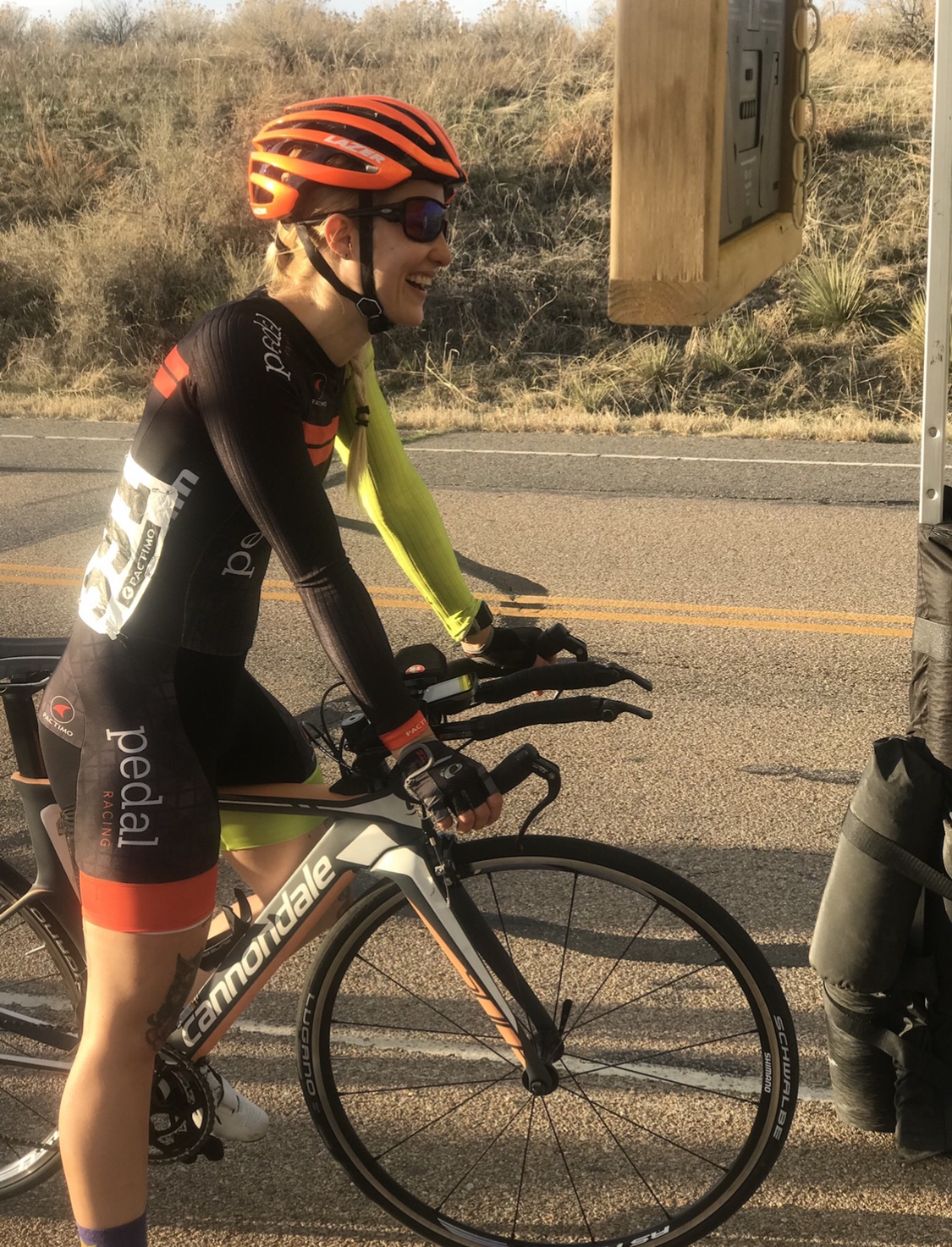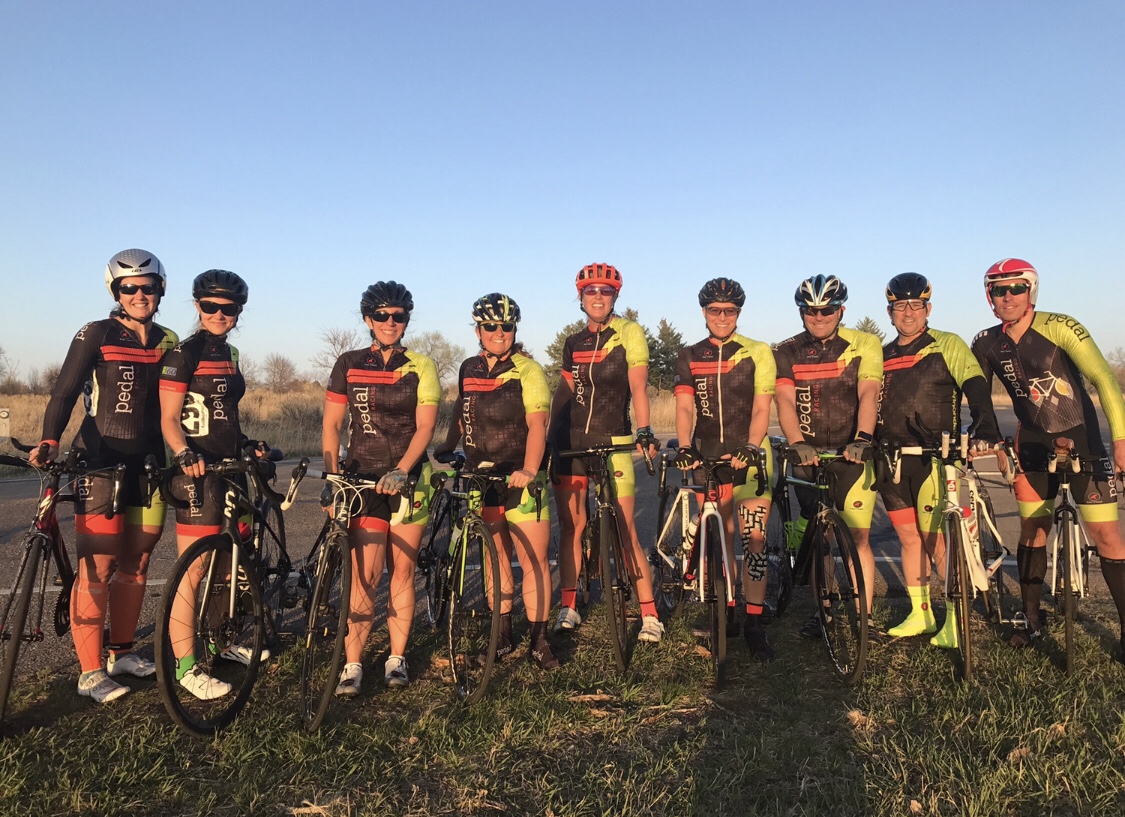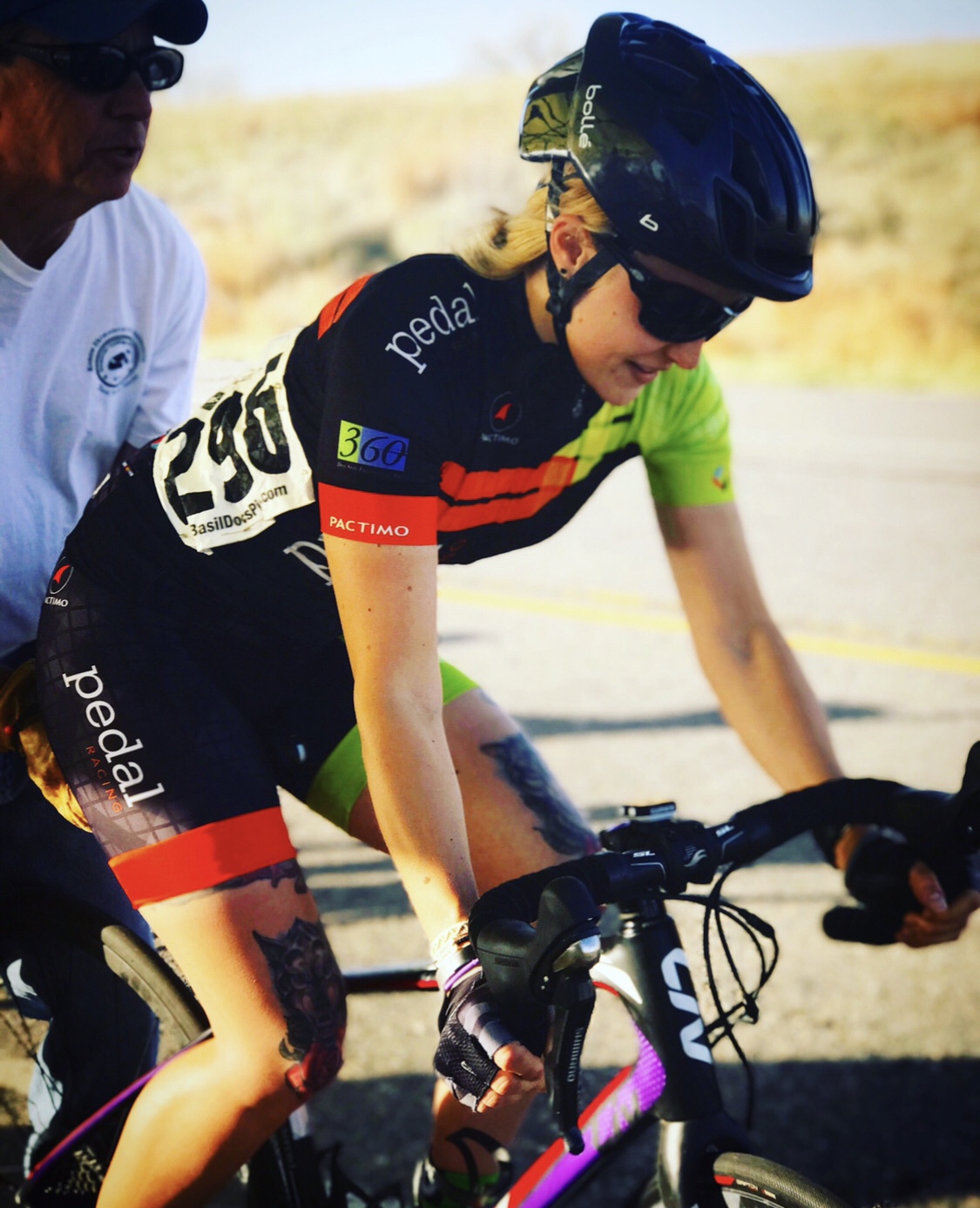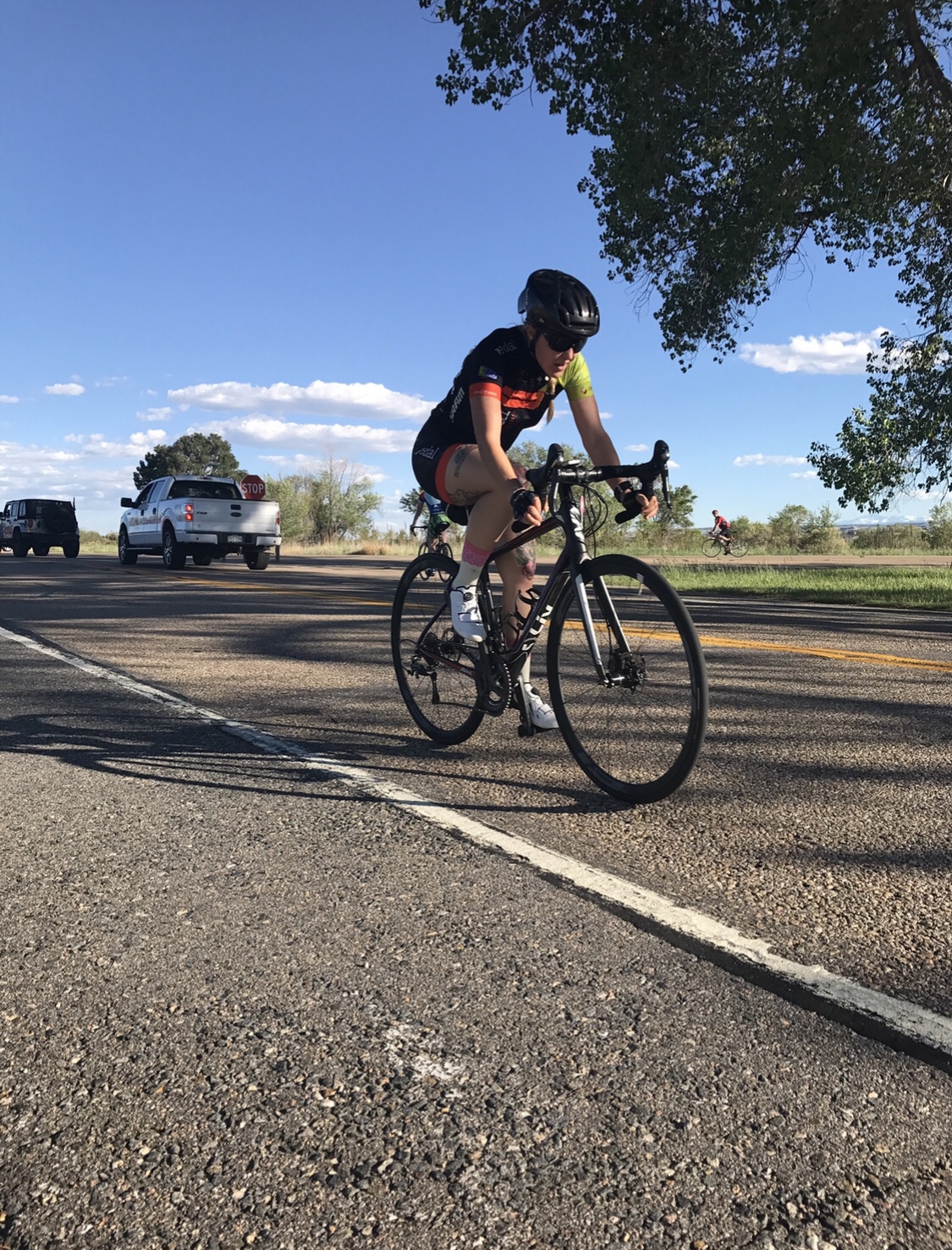Competition isn’t for everyone, I know. I often ask myself: Are we born competitive or is it a learned trait? Through my teens and early 20s, my idea of “getting my sweat on” was dancing at ska shows. Working out was a form of punishment for eating brownie and ice cream every night. That was until I found cycling. I had to borrow a mountain bike my cousin had outgrown. After enough time spent slogging uphill on the hunk of aluminum, I finally convinced myself buy a road bike.
As I donned cut-off sleeve shirts, I couldn’t help but notice groups of women all matching. I wanted to be part of something like that. I was drawn to the teams and their matching kits and being part of something bigger than my Rocky Horror Picture Show shirt flapping in the wind.
I originally joined pedal RACING’s club because I wanted women to ride with on the weekends. I was never planning on racing. As I sat around the table at the Egg & I, listening to the women share racing stories, I was intrigued, but also scared to take on an endeavor like that. I didn’t think I had the time to train or that I’d be any good if I tried. I assumed you had to be a professional with loads of time and loads of money to race your bike. I hear this from others today. I’m also told that “racing would take the fun out of cycling,” as if competition can’t be fun or you can’t be intrinsically motivated as a bike racer.

I was worried I wouldn’t like cycling as much if I pinned on a number
and pedaled the hardest I’ve ever pedaled in my life, but I started racing anyway. The way the women talked about past races, how their faces lit up recounting a win or loss, and how strong they felt after a training ride was contagious. I wanted to feel what it was like to line up with enthusiastic racers, my heart racing before the whistle, my team cheering me on, and to reminisce over grueling courses afterward.
I signed up for the Karen Hornbostel Memorial Time Trial Series on a whim as Chris and I drove up to Estes Park one weekend. I remembered the women telling me that time trials were the least scary, as in, I wouldn’t have to start or race in a group. I think that’s a lot of beginning women racers’ fears – conjuring images of 100-racers deep, shoulder-to-shoulder, like the Tour de France. Of course, the tv stations don’t show the reality of how uneventful racing that long of distances are. All you see are the highlights and crashes. It’s easy to view those recordings and think that’s all bike racing is: loads of crashes. Watch professional women’s racing. It’s much more about strategy, less testosterone.
Yes, there are crashes, but they are also usually avoidable.
As I read about the time trial series, I figured, hey, I already workout on Wednesdays, why not push myself into something I’ve never done before?

I had no idea how to train for time trials.
I was used to being in a constant and steady state over 100 miles. Going “ovaries out” for me waa riding 120+ miles at a steady speed.
When I pulled into Cherry Creek State Park, I had no idea what I was doing. My stomach knotted as I parked the car, scanning the crowd of (mostly male) cyclists on trainers, wearing skin tight kits and funny looking helmets. I had to get my “bib” when I arrived per the instructions on the website.
As I picked up my bib number: 274, the men asked for my license. I thought it was for USAC. Come to find out, I also needed the BRAC membership because having a racing license on a national level doesn’t matter on a local level. I had to pay these guys $5 if I wanted to race that day.
I missed the memo.

I also pinned my bib upside down.
I didn’t realize it was upside down until a kind lady in the lineup told me, “Dear, yours is upside down. Let me help you.” It was one of those, bless her heart moments, but at the same time I learned that women had each other’s backs, literally and figuratively.
With my number correctly pinned only in the corners (not aero I learned; you want it laid as flat against your body as possible), I pulled up to the start line. Another volunteer stood behind me, straddling my bike wheel, holding on to the bottom of my saddle to keep me steady as I clipped into both pedals. I giggled and he said, “Don’t worry, I’m not going to let you fall.” It was nearly comforting to hear since that was probably the first time I was told that. The other man started counting down: 10 seconds… 5..4..3..2..1..go.
I read that there was a bit of an incline before the first turn, so I eased off a bit. After the corner, I turned it up a bit and was passed. Mind you, racers started in 20 second increments, so anyone who passed me had at least 20+ seconds on me. You also didn’t know what category they were in as you simply signed up for a time slot that worked for you. I just kept hoping they weren’t in mine.
There was a headwind.
There were hills. There were turns. There were cracks and bumps and holes in the road big enough to pull you and your bike down. But there were roadside cheerleaders, screaming and ringing their cowbells.
I was on the last bit of uphill. I stood up and peddled up the incline, legs on fire, and I just kept thinking “push.” I saw this older man (women are the minority in most cycling events) at his truck, tape across the lane, walkie-talkie in hand and I assumed that was the end. I raised my right arm so he could see my correctly-positioned bib number and sure enough, he radioed in: “274.”
I lost my voice. I have never lost my voice from cycling, but then again, I’d never raced before that evening; against wind, against tri-bikes, aero bikes, hills, and strong-as-hell riders. I didn’t bring water with me because there was no time to drink when I was busy gasping for air instead.
I clocked in at: 28:23.9 & 6th place out of 10 women in my Cat 4. Chris was encouraging as I berated myself for “poor performance.” My goal for the following week was to jump one spot and cut off a minute.
Without music distracting me, I have to rely on my thoughts, and as a hardcore perfectionist, my thoughts aren’t always my best friend. People passed me as I coughed and wheezed. I kept trying to convince myself that they didn’t matter. I even said, “forget that guy” a couple of times. Only I didn’t say “forget.” And I repeated over and over and over: “I am strong. I am fast.”
There were a couple times I felt like I was going to puke. I thought to myself, “damn, if I feel like I’m going to spew, I must be riding super fast.” I was keeping my pace at 20 mph (minus the hills) and throwing all my weight into the pedals as I charged up hills.
I saw the old man, with his truck, the duct tape, and told myself, “Now’s the time to push. You only have to push yourself until that line.”
Well, I didn’t do that. I came in 6th again; but I shaved 22 seconds off my time, coming in at: 28:01.0.
Immediately, the perfectionist started yapping at me: You didn’t improve like you thought you would. You’re slow. You’re weak. Why are you even trying. Over and over. Chris tried to encourage me, but I wasn’t having it.
I looked at the other women in my category and how far behind I was from them. Scrutinizing my every turn, cadence, my lack of aero-ness, all the thoughts that riddled and boggled my mind. How the hell was I going to get faster?

Before racing, I didn’t think I’d like it.
I didn’t think it’d fun because I am a perfectionist. I thought racing my bike would take the fun out of riding it, as I know a lot of other women have told me.
But instead of focusing my motivation externally, like what place I came in or if I won an award, I started motivating myself intrinsically. I began to focus on how I could improve my skills and fitness, for me, not for a Top 3 placement.
Racing is a different kind of pressure you place upon yourself. You’re not “judged” on your performance in organized rides like ERock or the Triple Bypass. It’s just you riding your bike at your own pace, right? You don’t have to worry about how fast you’re going. You can stop when you want. You can talk with fellow cyclists along the route. There’s no pressure to perform.
I’ve learned to seek the pressure. The pressure is fear and it makes me fast. Fast means confidence; it means learned skills and support and teammates. It’s a whole new community that I didn’t know existed of women supporting each other, like my bib-helper. And fast is fun.
To this day, I get nervous and worry about my performance before the whistle is blown, at every race. If that’s your reason not to race, you’re not alone: we all feel the fear, but we do it anyway.
Thanks to my patrons who make my writing possible. You can become part of our club here:
This blog originally appeared in 303Cycling.


